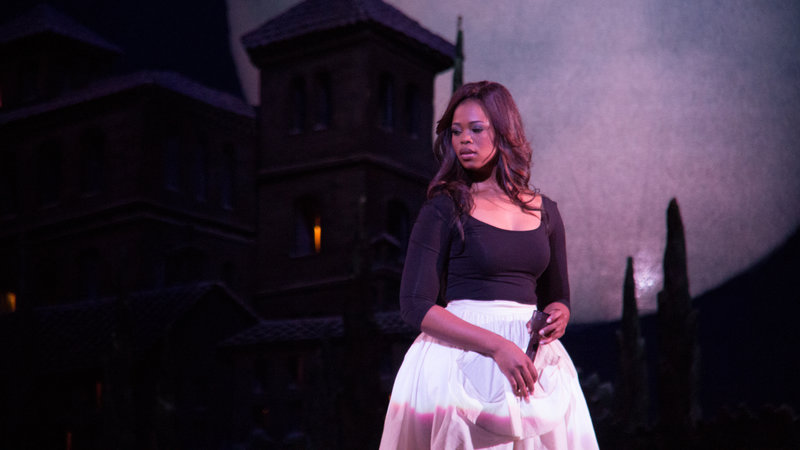When Pretty Yende took the stage as Adèle in Rossini‘s Le Comte Ory, her debut at the Metropolitan Opera, her performance didn’t go quite as planned. She tripped and fell, to the astonishment of the audience. Still, it was a night she could never have imagined when she was growing up in rural South Africa.
Yende didn’t even know what opera was until the day she was home watching TV and heard a snippet of the Lakmé “Flower Duet.” She was a teenager then; today, at 30, she’s a rising star in the international opera community. Beginning Saturday, she’ll be at the Los Angeles Opera starring in a production of Mozart‘s The Marriage of Figaro. She spoke about her journey with NPR’s Renee Montagne; hear the radio version at the audio link and read more of their conversation below.
Renee Montagne: I’m going to begin with a story that is often told — but it is too good not to tell it again, which is how you first encountered opera music as a teenager.
Pretty Yende: I was home with my family in South Africa in 2001. We were watching TV at home with my family, and this one evening, there’s this ad on TV. And behind the ad, there’s this music. It’s the British Airways advertisement — you know, they use the Lakmé duet.
And so I hear these sounds, just those 10 seconds. I knew that it’s something that I should know, but I didn’t know what it was. And so I went to my high school teacher the following day and I asked him what it was, and he told me it’s called opera. And I said to him, “Is it humanly possible?” Because at 16, growing up in a very small town, in Piet Retief, I had no idea that human beings were capable of such a gift. And so he told me that of course it is humanly possible. If you have the talent, you can do it. I said to him, “Well, you need to teach me that.”
And so he advised me to join the choir, and I joined the school choir. And he told me that, “Pretty, I don’t think you’re an opera singer. I don’t think you’re a singer at all. You shouldn’t be singing, you should just continue with your quest of being an accountant,” because that’s what I wanted to do before I heard the music. I wanted to be an accountant. But something had changed, something that I couldn’t touch or see, but something that I could feel, that I needed to know if somebody could feel the same way. It was an immense joy that I wanted to share with everyone.
You’ve described yourself as a church girl. Did you sing in a church choir?
I grew up in the church. I grew up singing in the church. I remember walking with my grandmother to church and she would teach me songs, and she would tell me that when we get to church, “You will go up and stand in front of the congregation and start singing.” So my solo career started there.
I know that a very important person to you was a teacher a little bit later, who was extremely key to finding your voice. Tell us about that.
Virginia Davids. I was very fortunate to have her, because once I got to the South African College of Music, I felt I was not good enough. I just found out about singing and I don’t even know if I can. But she was really kind enough to make me understand that each and every one of us are special in their own way, but I need to start actually looking at myself and really accepting myself as an individual. And so a big part of that is accepting this gift that I’ve just been given. I need to open my box and look what’s inside.
